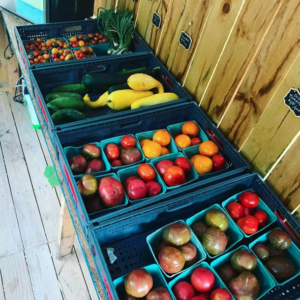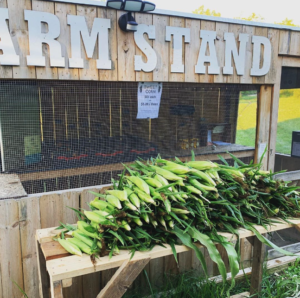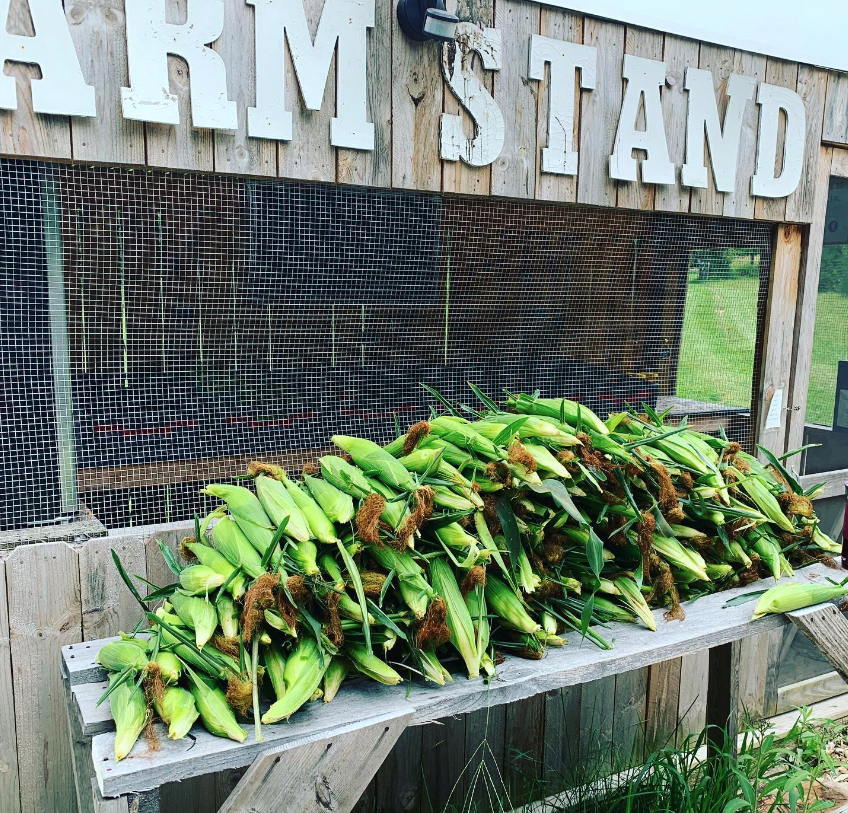Sustainable Living
Mud Creek Farm is a Growing Success
Writer / Brenda Hacker Freije
Photography Provided
 Mud Creek Farm began taking shape in 2018 when Nick Carter and his wife Kendra purchased 25 acres of land and a home there for their family between Sargent Road and Mud Creek, south of 86th Street in Indianapolis. Having grown up on a farm in rural Indiana, Nick understands the work and rewards in producing food. He wanted his children to learn those lessons and raise awareness about the benefits of local foods. The property provided the perfect location for both.
Mud Creek Farm began taking shape in 2018 when Nick Carter and his wife Kendra purchased 25 acres of land and a home there for their family between Sargent Road and Mud Creek, south of 86th Street in Indianapolis. Having grown up on a farm in rural Indiana, Nick understands the work and rewards in producing food. He wanted his children to learn those lessons and raise awareness about the benefits of local foods. The property provided the perfect location for both.
Years later, Mud Creek Farm is now a thriving local food producer and community resource. The solar-powered farm is located off a gravel lane on East 86th Street. There youll find a fridge stocked daily with fresh eggs, and seasonal produce fresh-picked from the farm and available for purchase on an honor system.
What are the challenges in establishing a new farm? A big one, Nick says, is learning to outwit the wild animals who like fresh produce as much as humans do. He learned that raccoons know when to pick sweet corn at peak ripeness. They once wiped out the farms first batch one season the night before Nick was planning to harvest. Now Nick installs a temporary strand of electric wire 6 and 18 off the ground to protect the corn thats ready to be picked. Raccoons can climb but they cant jump, and the simple electric fencing keeps them away.
Overall, the challenges have been surmountable, and the farm has exceeded Nicks expectations. He thought it might produce more food than the community would buy. He thought hed have a surplus to sell through Market Wagon, the online farmers market that Nick co-founded to give consumers access to local food delivered to their doorsteps or a local pickup spot. There hasnt been any surplus, and demand seems to be growing along with the farm.

For Nick, it is important that Mud Creek Farm helps to maintain local food supplies and provide an opportunity to learn about local food. For most of us, local food means heading to the local grocery where produce is shipped from faraway places inside and outside the U.S. Nicks idea of local is collecting the eggs his hens laid that morning and offering them for sale that day.
Why is local food so important? The pandemic has given us one reason. With supply chains disrupted, some grocery store shelves started to look bare. Things we assumed would be readily available, like beans, flower and yeast, were suddenly in short supply, and some items had to be rationed. The inclination to buy in quantity and stock up was strong and understandable. Even the Mud Creek Farm owners experienced panic buying early in the pandemic. Nick would stock his farm stand with dozens of eggs, and within an hour they would all be gone. Nick finally posted a sign asking the panic buyers to stop. His hens would keep producing eggs. Plenty of eggs would be available each day. Thats one advantage of local foods.
Local food doesnt have to travel far, requiring fewer resources to transport and keep fresh. Mud Creek Farm takes this a giant step further. Food produced at the farm requires fewer resources to reach our tables, and the farm itself also helps to restore the environment. How? Mud Creek Farm is a regenerative operation. As Nick explains, at the core of regenerative farming is the idea that soil should be alive with microbial and fungal activity. This allows the soil to harbor not only rocks and minerals, but also organic matter – chiefly carbon. (Your car emits carbon. Mud Creek Farms soil helps sequester it.) To keep soil alive, a farmer has to keep chemical use and tilling to a minimum, which Mud Creek Farm does.

Nick still has to battle weeds. To control them and provide fertilizer, Mud Creek Farm integrates small livestock, like goats and chickens, with the vegetable garden. Goats are the original weed eaters and they, along with the chickens, create natural fertilizer. As the Carters apply composted manure to the soil year after year, the soil is enriched, and each new layer suppresses more and more latent weed seeds in the soil, allowing for less and less tilling. In other words, the animals produce manure that feeds the soil, which harbors carbon, stops the weeds, and feeds the plants. This produces nutritious food that we can eat, along with the eggs the chickens lay each day.
Mud Creek Farm is showing us how we can address some of the complex challenges of excess carbon in the atmosphere, and how to ensure safe, reliable food supplies. Thank you, Carter family, for being trailblazers and good neighbors.
Mud Creek Farm is located at 9375 East 86th Street in Indianapolis. For more info, visit mudcreek.farm.






